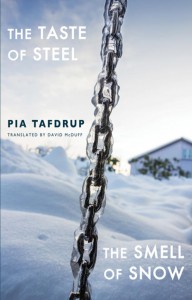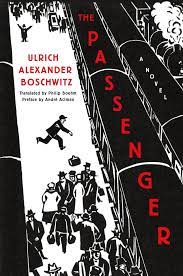Our chosen texts from around the world this month denote a certain defamiliarization with one’s environment, whether due to an intrinsic sense of alienation, or an enforced strangeness by a world unexpectedly altered. In literature, disparity is a powerful, effective motif for both the urgency of social commentary, and the exploration of the personal psyche, and the works presented here are exemplifications par excellence in both respects. From a collection of short science fiction tales from a Japanese counterculture icon, to a dual text of two poetry volumes by acclaimed Danish poet Pia Tafdrup, and a harrowing tale of exile and forced peripatetics in the immediate fallout of Kristallnacht. Read on to find out more!

Terminal Boredom: Stories by Izumi Suzuki, translated from the Japanese by Polly Barton, Sam Bett, David Boyd, Daniel Joseph, Aiko Masubuchi, and Helen O’Horan, Verso, 2021
Review by Rachel Stanyon, Copyeditor
Terminal complicity. Terminal addiction. Terminal jealousy. Terminal resignation. Terminal self-deception. Terminal love. Any of these could have been the title of Terminal Boredom, this engrossing first collection of short stories by Izumi Suzuki to appear in English translation. Given how prescient and succinct these tales are, it is surprising that they have taken this long to become available in English. With their worlds full of disillusionment and disaffection, youth unemployment and apathy, they will certainly strike a chord for modern readers interested in the emotional and societal effects of late capitalism, along with fans of sci-fi and speculative fiction.
In Japan, Suzuki is better known; there is even a novel (Endless Waltz by Mayumi Inaba, 1992) and a film (Koji Wakamatsu’s 1995 adaptation Endless Waltz) about the relationship between her and her jazz-musician husband, Kaoru Abe (Suzuki’s daughter sued over invasion of privacy at the book’s release, so read and watch as your conscience dictates). Suzuki, born in 1949, had a varied career, working as a key-punch operator, bar hostess, model, and actress, finding success as a writer before committing suicide in 1986, eight years after her then newly ex-husband had died of a drug overdose. These biographical details suggest that she understood intimately the sometimes hapless jobs, dependencies, and loneliness of the characters she depicts.
The scenarios constructed in the collections’ seven stories are varied enough to maintain interest, while the themes of apathy and detachment bind them together. “Women and Women” (tr. Daniel Joseph) describes a world plagued by resource scarcity in which men have been carved out of society and sent to a cunningly translated “Gender Exclusion Terminal Occupancy Zone” (GETO for short). This society is controlled through a sort of Orwellian erasure of history, and maintained by the complicity of the vast majority of its female inhabitants. Although the same-sex relationships are cast sympathetically, and, indeed, androgyny seems to be idolized throughout the collection, the story seems ultimately to condemn this ghettoized, vapid world. There does, however, remain a degree of ambivalence. The narrator soon comes across an escaped boy and “learn[s] the unexpected, dreadful truth about human life” before discovering that her mother was disappeared because she had fallen in love with a man and conceived naturally; in the end, though, our protagonist opts back into ‘normal’ life:
When I returned to my room, I noticed that my anguish was almost entirely gone. Women and women. Just as it should be. (. . .)
And yet . . . I put the pen down again before I was done. Now that I know about that thing, how can I ever be happy? To doubt this world is a crime. Everyone but everyone believes implicitly in this world, in this reality. I and I alone (well, probably not) know the great secret of this existence, and I’ll have to live out the rest of my life keeping it at all costs.
Right now, I have no intention of sacrificing my life for some underground resistance movement. But who knows, it might come to that someday.
The reader cannot, however, help but feel that it never will.
This first piece sets the tone for the rest of the stories, all of which end terminally. In the overpopulated world of “You May Dream” (tr. by Asymptote’s own editor-at-large for Japan, David Boyd), people are condemned through a corrupt lottery system (reminiscent of the dystopian film Logan’s Run) to a sleep from which they will probably never wake. Before being sent under, the subject’s memories are implanted into someone else’s dreams. Many of those called up go willingly, thinking they will eventually awake to a better world; others, like the protagonist’s friend, see through the lie, but make no protest except to haunt the dreams of those they’ve left behind. The only true escape is imagined as the oblivion of empty immortality:
I just want them all to stay sunny—Mum, Lucky, the doctor. It doesn’t bother me that I’m not going to see them anymore, not even a little. Different kinds of people belong in different kinds of worlds. And, lucky enough for me, mine’s a world within reach.
I want to keep on living. Forever. And that’s how it’s going to be. I’ll become a lone eye somewhere, floating, without consciousness.
‘That Old Seaside Club” (tr. Helen O’Horan) involves another kind of dreaming: this time, a “reboot” designed to help in “letting go and accepting things.” Instead, the characters spend most of their time on the imagined intergalactic resort avoiding their problems, projecting them onto other people, or failing to understand why they compulsively select melancholy music or gravitate towards people they think strangers. Despite the narrator imploring her husband that they not go through these reboots again, we cannot help but remember his nihilistic words from their shared therapeutic delusion: “The world won’t stop spinning. It’ll keep going, even if you don’t want it to. On and on, until you’re absolutely sick of it.”
Everywhere in this collection, relationships seem doomed—to unhappiness if not always to failure. In “Smoke Gets In Your Eyes” (tr. Aiko Masubuchi), the protagonist is addicted to a drug that ages her prematurely, to the point that her former lover barely recognises her. In “Forgotten” (tr. Polly Barton), the narrator’s relationship is full of distrust and jealousy. She resists and resents loving her partner, an alien from the peaceful planet Meele. Like many in the collection, this story also deals with addiction, along with colonialism and racism at both societal and interpersonal levels.
In terms of these stories’ literary quality, the dialogue stands out as the Achilles heel. The characters sometimes explain to each other elements of their societies in a way that seems only to serve the reader’s familiarisation with the mechanisms of the worlds. In “You May Dream,” the attempt to capture the voice of a sarcastic, disaffected, and disconnected young woman seems forced, with terse slang and a few too many juxtaposed idioms (the protagonist describes her friend in rather old-fashioned terms such as “a good soul,” before a breath later speaking about how they “vibe”).
This is, however, a minor quibble about what is otherwise an engaging and highly-relevant collection of short stories that will resonate with many readers, especially fans of writers like Philip K. Dick, Kurt Vonnegut, and even George Orwell, but from a refreshingly female perspective. More than thirty years after Suzuki’s death, the worlds she created are still striking and novel, despite being dotted with past visions of the future (cassette tapes and VHS still reign supreme) and sci-fi tropes (flying cars and intergalactic space travel abound); the technology, though, is never the focus, but rather a device to explore the dynamics and themes under Suzuki’s microscope. Many of the stories seem destined for a TV adaptation à la Black Mirror, and I for one know I’ll be tuned in for this, and the next collection of short stories Verso already has in the works.

The Taste of Steel and The Smell of Snow by Pia Tafdrup, translated from the Danish by David McDuff, Bloodaxe Books, 2021
Review by Marina Dora Martino, Assistant Editor
In detecting invisible dangers—such as poisonous berries or meat that has invisibly started to rot—one could deem taste and smell to be the most primally useful senses. Along with touch, they require a non-mediated, intimate approach to the world—a direct contact between our bodies and extraneous ones. For this reason, since the Middle Ages and beyond, they were labelled as base and bestial, while sight and hearing were deemed pure as the senses of distance, of premonition and planning ahead, of gauging without touching, allowing the body to remain uncontaminated by its surroundings.
In The Taste of Steel and The Smell of Snow, the first two volumes in a new five-part series of collections relating to the five senses by Danish poet Pia Tafdrup, the starting point is this: the essentiality of taste and smell, and their ability to puncture through the isolation of the mind. In our predominantly visual society, Tafdrup goes back to the two senses which, many argue, we are un-learning. The result is that the poet does not only look at their place in everyday sensualities, but also—and perhaps firstly—prods their limits, pushes their boundaries to see how far into the spiritual they would allow her to stretch. In The Taste of Steel, it’s not only the objects we are used to associating with taste that is bestowed the capacity of yielding flavour:
There isn’t much that doesn’t
taste of anything, broken glass
has a taste, the bread of angels,
paper, unrequited love,
the cry from the throat.
This is not a new poetic strategy—synaesthesia is as old as language—but it is the premise of an artistic research that doesn’t shy away from its larger implications. What lingers at the edges of metaphor? This is the most urgent of the poet’s questions: her need to map out the canals that would allow her a glimpse of what’s beyond. She doesn’t necessarily desire to communicate with, or question, what she sees, but she needs to know she can choose to contemplate.
The eyes slowly get used
to the darkness, but only
to stare into
a larger dark, stare oneself blind
at the questions of an enigma.
The universe, the afterlife, the dream, and time—not only past and future, but the infinitely regenerating present. The parallel lives of humans, plants, and animals collide in this collection without quite understanding each other, but nevertheless feels one another’s presence through the confusion of this multiplicity. Often, to find a path through chaos, Tafdrup juxtaposes or imposes one on top of the other these different forms of present life—the patterns emerging from this mind exercise are met by the poet with the awe of a new personal discovery, as evident in “Killer Whales”:
They exist, live at the same time as I,
rise, fall with metre-high splashing,
deafen me, blind me with their being. Like this
they can lead to anything, give an aftertaste
of the world’s beginning, my gaze
suddenly looks around: The world is open,
a breath makes the difference.
The Smell of Snow moves on a different plane; the poems in this collection deal less with the infinite and more with convergence, the right here and right now of the poet’s present. Even when it mentions memory, or the people who have vanished from her life, Tafdrup seems more concerned with the marks they have left in the present, with the ways they can continue to manifest in the tangible world around her. I was somewhat sorry to leave the sidereal atmosphere of the first collection, with light and thought always bouncing towards the unknown, but The Smell of Snow was clearly a response to that infinite, and somewhat cold, perspective. In contrast to The Taste of Steel’s evanescence, The Smell of Snow offers the grounding of a normal day, with parks, gardens, and snowy cityscapes, because “each flake seeks / its casual centre in the world.”
by means miraculous or barbaric, words are a breathing out and in,
I breathe in the smell of snow, breathe out, breathe in, like you.
In this second collection, technical words, facts about the senses, and observations of a more social-historical nature find their space in the lyrical. In “Noses, a comparative study,” the poet marvels at each individual’s capacity of forming a personal backlog of meaningful smells with which to identify for a lifetime; in “Memory bank for smells,” a similar concept is introduced, but this time through a versification of scientific information:
The moisture in the nasal cavity dissolves fine smell particles
to flowing form,
so around 40 million olfactory neurones
can capture a countless number of smells
to send them to the olfactory bulb,
the connecting link between nose and brain,
that transmits smell information,
There is a new sense of meditation and pondering—no more climbing above and peering beyond, but a pinning down. “The smell of snow is good, the snow tells no lies.” Pia Tafdrup looks for truths through precision. It was interesting to me that, when asked about her relationship with translator David McDuff, she highlighted the importance of—above all—his precision. “David is,” she says, “very precise and good at listening. When he’s translating, he has almost the same process as I have—throwing away, throwing away in order to condense.” Looking for the words that feel right, the poet and translator engage in a long back and forth until the poems read as if they were thought in English. This shows in both collections; in the first, through the transparency with which the spiritual is laid out, starting from a lake, a rock or a formation in the sky, to end in the “the brain’s prehistoric darkness.”; in the second, it manifests through the many shades of everyday life.

The Passenger, by Ulrich Alexander Boschwitz, translated from German by Philip Boehm, Pushkin Press, 2021
Review by Charlie Ng, Editor-at-Large for Hong Kong
The Passenger is a story of a man on the run. Jewish-German merchant Otto Silbermann must flee not because he is a suspect—or even that he has been mistaken as one—but because of the malefactions of the dictatorial Nazi regime. Written in 1938, The Passenger is a literary witness to the Kristallnacht, the November pogroms carried out by the SA paramilitary forces, and the beginning of a violent turn in the Nazi persecution of the Jewish peoples. This political situation destroys overnight the ordinary business and family life of Silbermann. As he changes from train to train in Germany to escape the SA, the country—even the world—eventually becomes a prison for him. The resulting disorientation and the impossibility of escape suggests a hint of similarity with Franz Kafka’s The Trial, but what’s more frightening is the realistic urgency. What Ulrich Boschwitz offers us is not an expressionist narrative, but a sobering representation of the hopelessness in having nowhere to go.
Boschwitz’s criticism on the world’s indifference after the Kristallnacht is unsparing. In the “Afterword to the German Edition,” Peter Graf remarks that reports on the Kristallnacht by foreigners in Germany were not lacking, but that international help was scarce. Throughout the story, Silbermann relies on his son Eduard, who lives in Paris, to arrange for a permit for him and his wife to go to France, but the effort is in vain. Silbermann’s conversation with a fellow escapee, Lilienfled, on the train also reveals further facets of this despair; Lilienfled divulges to Silbermann that he has the address of a certain man, presumably a Nazi, who can help Jewish people get pass the border, but that “he takes anything of value” for the assistance. Silbermann has to choose between his hard-won earnings, or a bare-boned survival. He decides to go for neither, attempting instead to cross the border himself to Belgium illegally through the forest. Being discovered by two frontier guards, Silbermann’s emphasis on his Jewish refugee identity is only met with a cold reply: “Mais quand-même,” a French phrase that echoes the pet phrase of the old man who had lent Silbermann a room to stay for one night before his border crossing: “All the same.” The phrase encapsulates the despair of Silbermann—travelling from city to city, meeting friends and strangers, with no sense of a way out. Despite having held on to the conviction that the thirty thousand marks from his business partner would open up doors—“Why should a person commit suicide when he’s carrying a briefcase full of life?”—being sent back to Germany at the border shatters the hope.
After the failed attempt at escape, the story picks up a more agitating momentum, mirroring Silbermann’s disarrayed mind. The use of internal monologue is powerful in its narrative impact, revealing his guilty attraction to a beautiful woman, Ursula Angelhof, on the train, and his annoyance with the unexpected and inconvenient accompaniment of an old friend. In Silbermann’s conversation with Ursula, the reader is reminded that the figure of Silbermann is as an ordinary man, a common citizen who wishes to live normally in his country: “And imagine, I served on the front! I was a citizen like everybody else.” But despite the similarity of his facial features with that of the Aryans and those with privileged German citizenship, his fate is determined by the “big red J” stamped on his passport. The struggles of Silbermann embodies that of the hundreds of thousands of Jews living in Germany at that time; Peter Graf points out that the endless travelling of the protagonist also indirectly reflects Boschwitz’s own experience of escape; he had emigrated to Sweden, Norwary, and France with his mother between 1935 and 1938. The nomadic fate of the Jewish peoples is continually echoed in the exile of Boschwitz, and the prolonged journeys of his protagonist.
Boschwitz’s writing style is never too sentimental. While the tone suits the practical-minded businessman, the emotional fluctuation that is eventually honed, leading to the gradual breakdown of the rational man, is particularly unsettling. The novel’s cinematic atmosphere is prominent, enhancing the vividness of the increasing fear felt by Silbermann, and Philip Boehm’s lucid rendering is a significant contribution to the dramatic quality of the novel. Despite the premature death of the young writer and the lack of attention to the novel’s first English translation in 1939 under the title of The Man Who Took Trains, this re-translation of The Passenger proves that the text deserves better recognition, amongst the totems of literature written in the light of one of the twentieth century’s most harrowing collective crimes against humanity.
*****
Read more on the Asymptote blog:
- What’s New in Translation: March 2021
- What’s New in Translation: February 2021
- What’s New in Translation: January 2021

